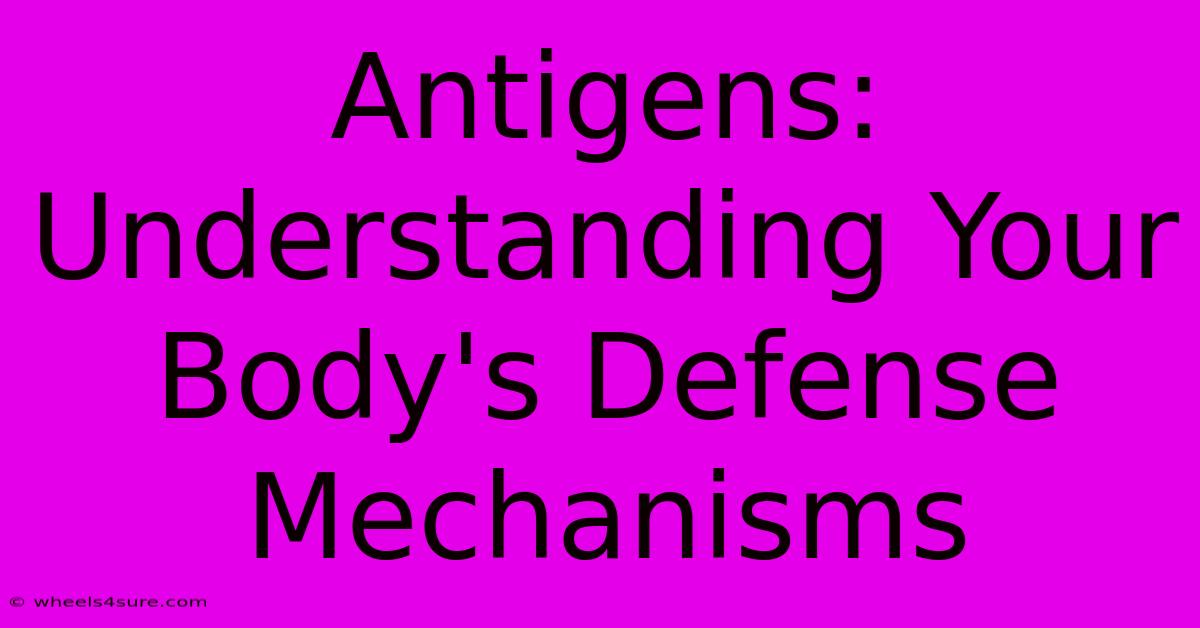Antigens: Understanding Your Body's Defense Mechanisms

Table of Contents
Antigens: Understanding Your Body's Defense Mechanisms
Our bodies are constantly under siege. From the bacteria on doorknobs to the viruses circulating in the air, we're exposed to a myriad of foreign invaders. Our immune system's ability to defend against these threats hinges on its ability to recognize and neutralize antigens. Understanding antigens is key to comprehending how our bodies protect themselves and how diseases develop.
What are Antigens?
Simply put, an antigen is any substance that can trigger an immune response. This response is designed to identify and eliminate the antigen, preventing it from causing harm. These substances can be:
- Proteins: Many viruses and bacteria have proteins on their surfaces that act as antigens.
- Polysaccharides: These complex carbohydrates are found on the surface of some bacteria and fungi.
- Lipids: Certain fats and lipids can also trigger an immune response.
- Nucleic acids: DNA and RNA from viruses can also serve as antigens.
Essentially, anything that the body recognizes as "non-self" can be considered an antigen. This includes:
- Pathogens: Bacteria, viruses, fungi, and parasites.
- Toxins: Poisonous substances produced by bacteria or other organisms.
- Allergens: Substances like pollen, pet dander, or certain foods that trigger allergic reactions.
- Transplanted tissues or organs: The body's immune system will recognize these as foreign and try to reject them.
- Cancer cells: The immune system can recognize and attack mutated cells that are behaving abnormally.
How Antigens Work: The Immune Response
When an antigen enters the body, it's detected by specialized cells of the immune system, primarily B cells and T cells. These cells possess receptors that specifically bind to certain antigens. This binding acts as a trigger, initiating a cascade of events:
- Antigen Presentation: Antigen-presenting cells (APCs), such as macrophages and dendritic cells, engulf the antigen and present fragments of it on their surface to T cells.
- T Cell Activation: Helper T cells recognize the antigen fragment and become activated. They then release cytokines, signaling molecules that stimulate other immune cells.
- B Cell Activation: B cells that have receptors specific to the antigen also become activated. They differentiate into plasma cells, which produce antibodies.
- Antibody Production: Antibodies are Y-shaped proteins that bind to the antigen, neutralizing it or marking it for destruction by other immune cells.
- Elimination of Antigen: The antigen is either neutralized directly by antibodies, engulfed by phagocytic cells (like macrophages), or destroyed by cytotoxic T cells.
The Importance of Understanding Antigens
Understanding antigens is crucial for several reasons:
- Vaccine Development: Vaccines introduce weakened or inactive forms of antigens to stimulate an immune response, preparing the body to fight off the actual pathogen in the future.
- Disease Diagnosis: Identifying specific antigens in the body can help diagnose various infectious diseases and autoimmune disorders.
- Treatment of Diseases: Various treatments, like antibody therapies, target specific antigens to neutralize pathogens or cancer cells.
- Transplantation: Understanding antigen recognition is vital for minimizing organ rejection in transplantation procedures.
- Allergy Management: Knowing which allergens trigger immune responses helps in managing allergies and developing effective treatments.
Conclusion: The Complex World of Antigens
Antigens play a central role in our body's intricate defense system. Their recognition and neutralization are fundamental to our health. By understanding the complexities of antigen-antibody interactions and the immune response, we can better appreciate the remarkable mechanisms that protect us from disease. Further research into the nuances of antigen recognition and manipulation continues to pave the way for advancements in medicine and disease prevention.

Thank you for visiting our website wich cover about Antigens: Understanding Your Body's Defense Mechanisms. We hope the information provided has been useful to you. Feel free to contact us if you have any questions or need further assistance. See you next time and dont miss to bookmark.
Featured Posts
-
Jaxson Dart Family Values Above All Else
Apr 12, 2025
-
Aamir Khans Daughters Culinary Skills
Apr 12, 2025
-
Uncovering Family Roots Dads Incredible Journey
Apr 12, 2025
-
Dhonis Net Worth The Power Of Brand Dhoni
Apr 12, 2025
-
Jay Shah S Life And Times A Comprehensive Look
Apr 12, 2025
